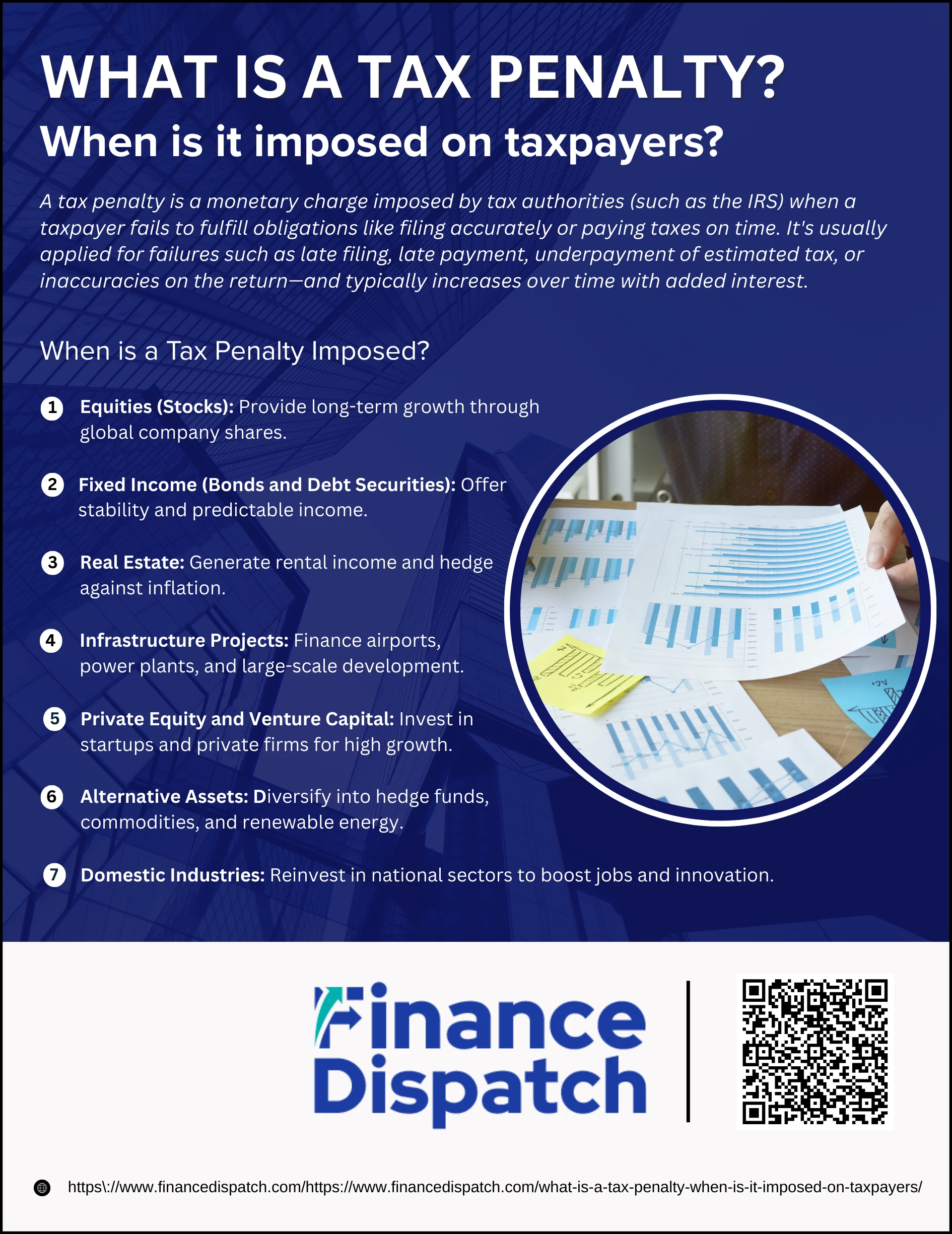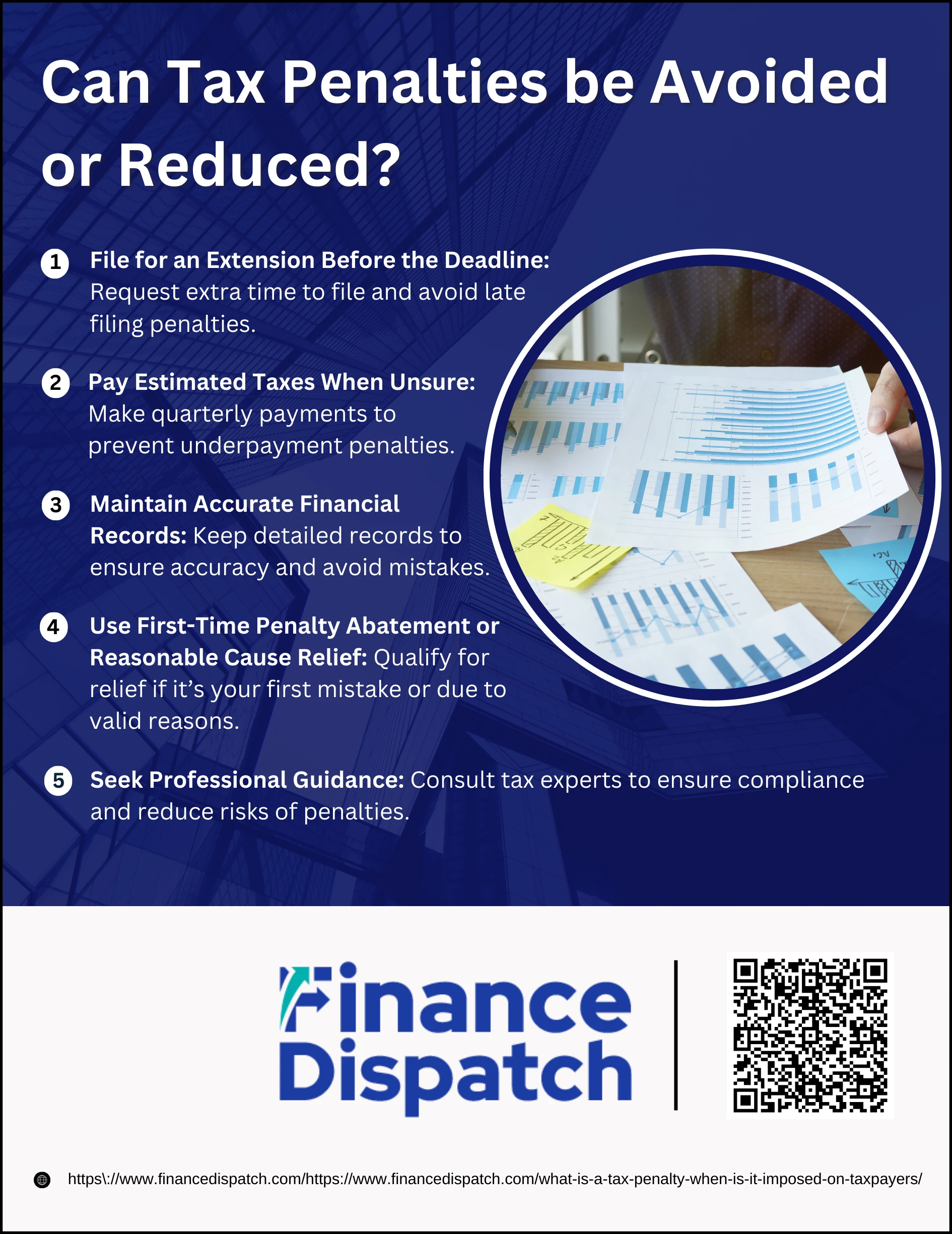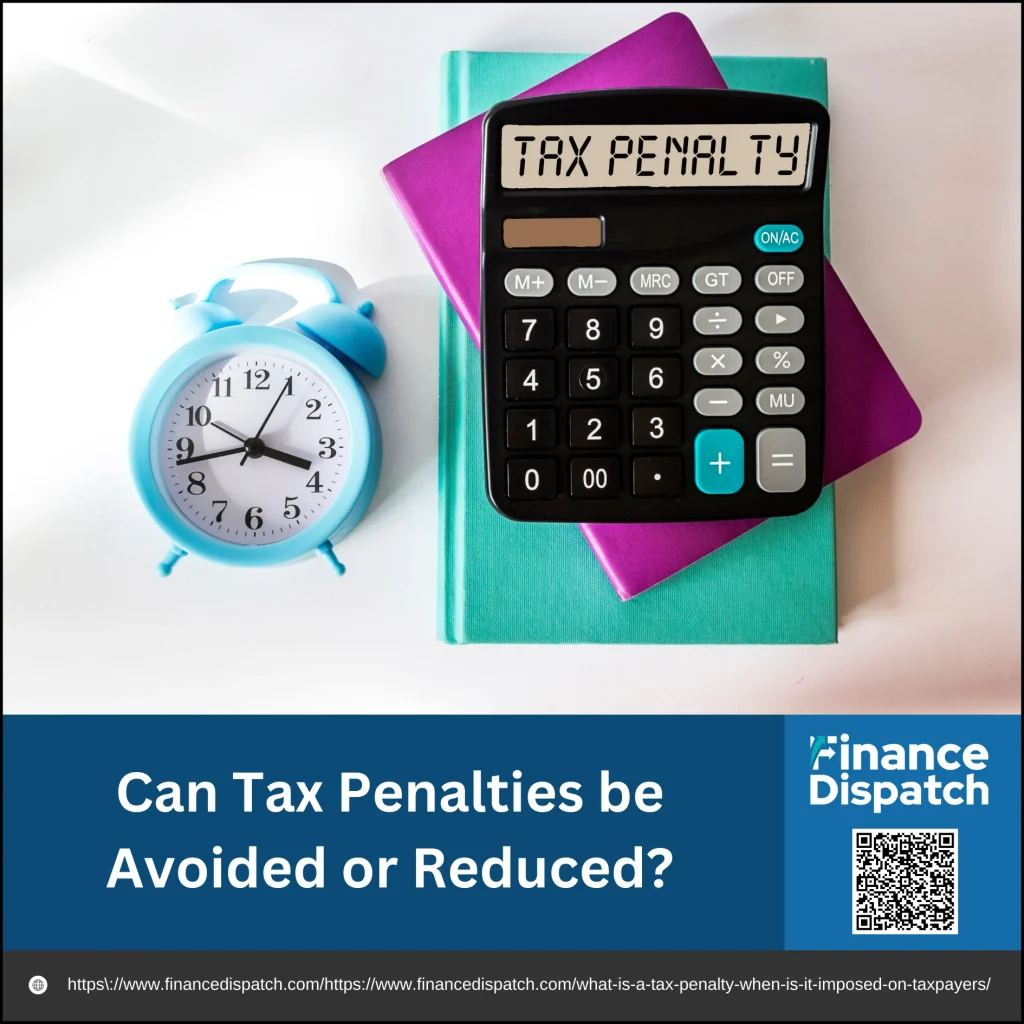 When it comes to taxes, most people focus on filing returns and paying what they owe, but an equally important part of the process is understanding tax penalties. A tax penalty is essentially a fine that the government imposes when you fail to meet certain tax obligations, such as filing late, paying after the due date, or providing inaccurate information. These penalties are designed not just to collect revenue, but also to encourage compliance and fairness in the tax system. Knowing what tax penalties are and when they apply can save you from unnecessary financial stress and help you stay on the right side of tax laws.
When it comes to taxes, most people focus on filing returns and paying what they owe, but an equally important part of the process is understanding tax penalties. A tax penalty is essentially a fine that the government imposes when you fail to meet certain tax obligations, such as filing late, paying after the due date, or providing inaccurate information. These penalties are designed not just to collect revenue, but also to encourage compliance and fairness in the tax system. Knowing what tax penalties are and when they apply can save you from unnecessary financial stress and help you stay on the right side of tax laws.
What is a Tax Penalty?
A tax penalty is a financial charge imposed by the government when you do not meet your tax responsibilities on time or in the correct way. It acts as both a punishment for non-compliance and a deterrent to prevent future mistakes. Unlike regular taxes, which are the amounts you owe based on income or transactions, penalties are extra costs added for errors such as late filing, delayed payments, or inaccurate reporting. In simple terms, a tax penalty is the price you pay for not following tax rules, and it can vary depending on the type of mistake and how long it remains uncorrected.
Types of Tax Penalties
Not all tax penalties are the same. Depending on the nature of the mistake or delay, the government applies different types of penalties, each with its own rules and rates. Some are charged for being late, while others are tied to errors, negligence, or even intentional fraud. Understanding these categories can help you recognize where you might be at risk and how to avoid them.
| Type of Penalty | Description | Example |
| Late Filing Penalty | Charged when you fail to submit your tax return by the deadline. | Missing the April 15 filing date. |
| Late Payment Penalty | Imposed if you file your return but do not pay taxes owed on time. | Paying your tax bill three months late. |
| Accuracy-Related Penalty | Applied when errors, negligence, or substantial underreporting of income occur. | Claiming ineligible deductions or misreporting income. |
| Fraud Penalty | The most severe, for intentional attempts to avoid paying taxes. | Hiding income in offshore accounts. |
When is a Tax Penalty Imposed?
Tax penalties are imposed when you fail to comply with tax rules, whether through oversight, error, or deliberate action. Some penalties are relatively small and easy to resolve, while others can have lasting financial and even legal consequences. Below are the most common situations where penalties apply, explained in detail:
1. Filing Tax Returns Late
When you miss the deadline to file your tax return, the tax authority typically charges a late filing penalty. This penalty usually increases the longer you delay, often calculated as a percentage of the tax owed per month. Even if you cannot pay your taxes immediately, filing on time helps you avoid this specific penalty.
2. Paying Taxes After the Deadline
Filing on time doesn’t protect you from penalties if you fail to pay the taxes you owe by the due date. In this case, a late payment penalty applies. It is often accompanied by interest charges, which continue to build until the full amount is paid. This makes paying late more costly the longer you wait.
3. Underreporting Income
If you make mistakes in your return—such as forgetting to include freelance earnings, rental income, or other taxable amounts—you may face an accuracy-related penalty. Tax agencies treat underreporting seriously, as it affects the fairness of the tax system. Even unintentional mistakes can result in financial penalties.
4. Negligence or Inadequate Records
Tax laws require you to keep accurate records of your income, expenses, and deductions. If you fail to maintain these records or show negligence in preparing your return, you may be penalized. For example, claiming deductions without proper receipts or failing to track business expenses can trigger penalties.
5. Deliberate Tax Fraud or Evasion
The most severe penalties apply when fraud or intentional evasion is detected. This goes beyond simple errors and involves knowingly providing false information, concealing income, or using illegal methods to avoid paying taxes. Fraud penalties are much higher than standard penalties and may also involve legal prosecution.
How are Tax Penalties Calculated?
Tax penalties depend on the type of non-compliance, the amount of tax owed, and the length of the delay. Some are charged monthly until you correct the issue, while others are one-time penalties or fixed amounts. Authorities often calculate them as a percentage of unpaid tax, so the longer you wait, the more costly it becomes. Here are the most common ways they are calculated:
1. Late Filing Penalty – This penalty is based on how late you submit your tax return. It is often calculated as a percentage of the unpaid tax for every month or part of a month that the return is overdue. Most systems also cap the maximum penalty after a certain number of months to prevent it from becoming unmanageable.
2. Late Payment Penalty – Even if you file your return on time, you’ll face a penalty if you don’t pay the taxes owed by the due date. This is usually a smaller percentage compared to late filing, but it accrues every month until the full amount is paid. Interest is also added, making the debt grow steadily over time.
3. Accuracy-Related Penalty – When errors or negligence lead to underpayment of taxes, the penalty is usually calculated as a set percentage of the underpaid amount. For example, if you underreport your income by $5,000, the penalty could be 20% of that amount.
4. Fraud Penalty – If tax authorities determine that you intentionally tried to hide income or falsify records, the penalty is much harsher. It’s often calculated as a large percentage of the underpaid tax—sometimes up to 75%—to discourage fraudulent behavior.
5. Fixed Fees for Minor Offenses – Not all penalties are percentage-based. Some are flat dollar amounts, such as penalties for missing required information forms or filing certain documents late. These are usually smaller but can add up if multiple forms are involved.
 Can Tax Penalties be Avoided or Reduced?
Can Tax Penalties be Avoided or Reduced?
Tax penalties are meant to enforce compliance, but that doesn’t mean you’re helpless if you run into filing or payment issues. By taking preventive steps and knowing your rights, you can either avoid penalties altogether or reduce them significantly. Below are some detailed ways to stay ahead:
1. File for an Extension Before the Deadline
If you realize you won’t be able to finish your tax return on time, you can request a filing extension. This extension gives you additional months to file your paperwork without facing late filing penalties. However, it’s important to note that the extension only applies to filing, not to paying. If you expect to owe taxes, you should still pay as much as possible by the original due date to avoid late payment penalties.
2. Pay Estimated Taxes When Unsure
For freelancers, contractors, or self-employed individuals whose income may not be taxed at the source, estimated tax payments are crucial. These quarterly payments help cover your tax obligations throughout the year. Even if you’re unsure about the exact amount, paying a reasonable estimate reduces the likelihood of underpayment penalties. Paying something is always better than paying nothing, as it shows good faith and keeps penalty amounts lower.
3. Maintain Accurate Financial Records
Good recordkeeping is one of the simplest yet most effective ways to avoid penalties. Keeping receipts, invoices, income statements, and expense logs ensures that the numbers you report on your return are correct. This reduces the risk of mistakes, underreporting, or deductions being disallowed. Proper documentation also gives you a solid defense if tax authorities question your return.
4. Use First-Time Penalty Abatement or Reasonable Cause Relief
If you’ve generally been compliant in past years and this is your first slip-up, you may qualify for a “first-time abatement” that removes or reduces the penalty. Additionally, if your failure to file or pay was due to circumstances beyond your control—such as illness, natural disaster, or misinformation from a tax professional—you can apply for “reasonable cause relief.” These programs recognize that mistakes happen and provide a safety net for taxpayers acting in good faith.
5. Seek Professional Guidance
Tax rules can be complex, and even small errors can trigger penalties. Hiring a tax professional or consulting an accountant helps ensure that your return is accurate and your payments are properly managed. Professionals can also identify credits and deductions you might miss on your own, and they know how to apply for penalty relief if you qualify. In many cases, the cost of professional advice is far less than the penalties you might face without it.
Consequences of Ignoring Tax Penalties
Ignoring tax penalties can make a small problem much bigger over time. What may start as a minor fine for late filing or late payment can quickly snowball with added interest and additional penalties. If left unresolved, tax authorities can take serious actions such as garnishing your wages, placing liens on your property, or even seizing assets to recover the debt. In cases involving fraud or deliberate evasion, the consequences may include criminal charges, which can lead to court proceedings and, in extreme situations, imprisonment. Beyond the financial and legal risks, unpaid tax penalties can also damage your creditworthiness, making it harder to secure loans or mortgages in the future.
Conclusion
Understanding tax penalties is essential for staying compliant and avoiding unnecessary financial stress. These penalties are imposed when you fail to meet key tax obligations, such as filing late, paying after the deadline, or providing inaccurate information. While they can be costly, most penalties are preventable if you file on time, pay what you owe, and keep accurate records. Even if you make a mistake, options like penalty relief or professional guidance can help reduce the burden. By staying proactive and informed, you can protect yourself from escalating fines and focus on managing your finances with confidence.



